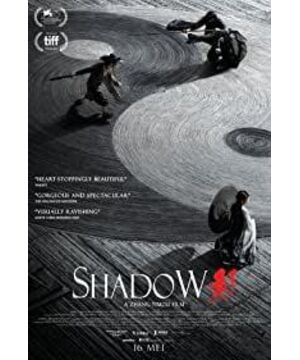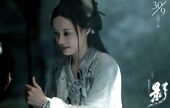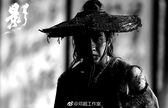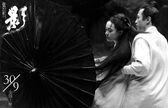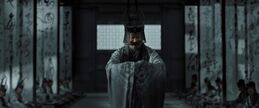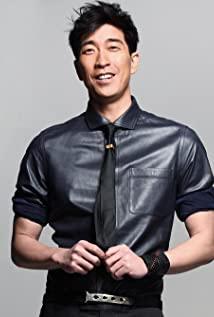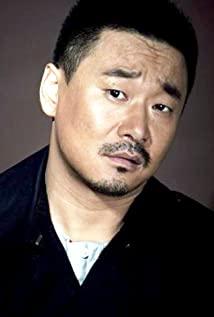Zhang Yimou’s new film "Shadow" was released as scheduled. When I saw this big investment movie in the theater, I believe everyone who is familiar with the film will ask themselves, if they have the same opportunity, would they dare to make such a movie like Zhang Yimou’s Movie?
What kind of story does "Shadow" tell? The story of a stand-in. In the center of the story is a stand-in and the people around him. Behind the story is a vast and cruel era.
▲Ziyu and Jingzhou.
In the Eastern Han Dynasty Peiguo, the chief governor Ziyu wanted to regain the Jingzhou occupied by General Yang Cang. The negotiation failed and the competition also failed. After such a serious failure, he quickly abolished. His body was withered and his energy was weak. The stage was walking behind the scenes. You must know that although a politician is a politician, he is also an idol. A person who is both spiritual and physical cannot be an idol.
He has only one way, to find a substitute. Fortunately, he had prepared such a person for himself very early, a young man who looked exactly like himself, but was strong and handsome, and imprisoned him, brainwashed, and physically attacked him, making him willing to become his substitute. . Afterwards, he was rigorously trained, so that he could learn everything he was good at, from martial arts to coping in court.
This young man does not even have his own name, a stand-in, a shadow. It is impossible to have a name, nor should he have a name. They call him "Jingzhou", which is equivalent to being nameless and not being treated as a person. He is the heart. Knot, the endorsement of that lost land.
▲Jingzhou and Xiaoai. An aging man, a young stand-in, and a thirsty wife. A similar plot also appeared in Zhang Yimou's movie "Ju Dou".
After he was hit and fell into depression, this stand-in, this "shadow" came into play. As a stand-in, Jingzhou has to deal with King Pei on behalf of Governor Ziyu, deal with courtiers, fight against Yang Cang, and get along with Ziyu’s wife Xiao Ai, play the piano, develop new weapons, and show the love of the couple.
Everyone’s situation is difficult. Everyone has a lot of desires and entanglements. Everyone is forced to question their own human nature and face the sinisterness of others. The black, white, and gray of the human heart spread out like ink and wash.
Therefore, when talking about the ink style in "Shadow", Zhang Yimou once said that he chose ink style because the story is about the complexity of human nature, and the layers and changes in ink and wash are exactly the middle part of human nature. The gray area in the middle part is indescribable.
Zhang Yimou thought of such a story because when he watched Akira Kurosawa's "Shadow Warrior" many years ago, he thought about why there is no such a stand-in story in China. Later, he read Zhu Sujin's script "Three Kingdoms·Jingzhou". This script is very exciting, but it has been repeated in many places. He had planned to start filming twice, but nothing happened.
Zhang Yimou saw this story and felt that it could evolve into a story dominated by the destiny of a substitute in the context of a great era. When I talked to Zhu Sujin about this idea, I found that it was incompatible. All parties asked for opinions. Everyone also believed that this story could not be placed in the context of the Three Kingdoms. There were many constraints.
▲Work photos of Zhang Yimou and Wu Lei. Zhang Yimou said that the use of young actors in this film is not because of traffic factors, but because they have their own good points. Traffic actors will inevitably grow up.
So Zhang Yimou started all over again and wrote a story with an overhead background. In the final movie, we can see some plots left over from Zhu Sujin’s script. For example, Jingzhou pretends to be a Ziyu, went to Yang Cang to repay Jingzhou but was refused, reported the matter to King Pei, and was regarded by King Pei as destroying the two countries. alliance.
This is the legacy of the plot in "Three Kingdoms: Jingzhou" in which Zhou Yu negotiated with Guan Yu and demanded that Jingzhou be returned to Soochow. Sun Quan also said that "I would rather never take Jingzhou, not to destroy Liu Sun's alliance", and Guan Yu refused to take his daughter. Married to Soochow, and in the story, Peiguo intends to use marriage to maintain peace, but the plot is humiliated by the other party. In both stories, there is also a female character named Qingping.
But "Shadow" and "Three Kingdoms·Jingzhou" are very different. Not only are the stories different, but more importantly, "Three Kingdoms·Jingzhou" is about the feelings of the family and the country, personal ambitions, gold and iron horses, big rivers, and "Shadow" But it's telling the gray area in human nature. "Shadow" uses a personal perspective to enter that era, to tell the ethics and order of the Chinese people, generation after generation as a stand-in for tigers, and the endless cycle of destiny from generation to generation.
▲Zheng Kai plays King Pei and he has an outstanding performance. The film critic said: "The superficially insane, but inner but very strategic image of Pei Wang played by Zheng Kai is very difficult to be expressed. People can only see the superficial things, thus deceiving the audience, and then at a certain moment. Make them wonder whether this character is really stupid or fake."
Jingzhou originally had his own self. He had a hometown and a mother. Just like Xiao Ai said: "You were born in Jingzhou and you are waiting to go home." But because of the changing situation, he became a refugee, and Because she looked exactly like Ziyu, she became a stand-in. As a stand-in, he has only his body, no soul, and lost himself. It is like a quilt on his upper body. Ziyu needs a younger and more powerful body, and he is that body. When Ziyu made a wound on his body, he actually said "press it for me." Ziyu didn't feel that this was another body, only that he was an extension of his own body.
▲Two Deng Chaos are now in the same picture, and there are dialogues and actions. Many people will want to know how they were filmed in this movie.
He wants to learn Ziyu’s words and behaviors and his hobbies step by step, but his learning is limited to dancing knives and guns, similar to hobbies like drumming and playing piano. Such more advanced, spiritual skills, he cannot learn. Yes, that's why it was embarrassing when King Pei asked them to play the piano.
He also has to figure out Ziyu's thoughts, including Ziyu's coveting for the throne, he has learned to be fake. During the dialogue with King Pei, when King Pei asked him if he had such a mind, he answered very domineeringly.
This is beyond the scope of the stand-in's duties. What's even more superb is that he even has feelings for Xiao Ai, and Xiao Ai is also getting along for a long time, and in the fake scenes, he has expectations for him. This kind of expectation will eventually arouse the real him, and he will use his true self and true desires to face Xiao Ai.
Therefore, in terms of identity, status, and power, he must become a real Ziyu little by little, and from the heart, desire, and emotions, he must remove the shadow of Ziyu little by little. Two "impossible tasks" must be carried out at the same time.
For Ziyu, the situation is even more complicated. After a series of blows, Ziyu described withered, and there must be problems with his physical functions. Peeping at Jingzhou and Xiao Ai's intimacy was enough to show his inadequacy. For a politician, the disability of the body and the disappearance of desires are fatal injuries. He must beat the spirit, bluff, and give a false impression in front of everyone.
▲Zhang Yimou is very good at taking pictures of women. In his movies, there is always a character full of maternity. In "Shadow", this character belongs to Sun Li.
When Zhang Yimou interpreted the character of Ziyu, he once said: "Every step he takes is actually struggling to survive. Even if he finally seems to become the boss, ordering the world, in fact, he can only live in this way. Come down."
Jingzhou is not only a substitute for his physical body, but also a substitute for his desires. But it is very dangerous to nurture desires, and desires will grow up after being fed. Just like a tiger, it is cute and safe at first, but after constantly feeding it nourishment, it will surely grow into a big tiger. What Ziyu started was just such a process of raising tigers.
After seeing the great world and tasting the sweetness of power, Jingshu, as the deity of desire, began to be constantly fed. He has already obtained some, but what he has obtained may be taken away at any time. He wants to keep the already I got it, I have tasted it, and I want to get more. Desire gradually expanded, and finally bitten the master.
Jingzhou originally appeared as Ziyu’s positive face (in this movie, there are a lot of black and white, yin and yang images). His pain was pure at first, and his doubts were real at first, what he longed for Justice is also justice for many people. And Ziyu is his dark side. But if you concentrate on the abyss for a long time, you will become an abyss, fighting against the dragon, and you may also become the dragon.
Jingzhou finally ended his stand-in career, but the price he paid was to completely become his former master. Will he still be pure? Will he still be real? Will he still yearn for justice? We know that this is impossible, he will inevitably become a new Ziyu, and even a new Peiwang.
▲Deng Chao paid a great price for this movie. He has to gain weight to 85 kg in a short period of time to play Sakaishu, and he has to lose weight to 63 kg in a short period of time to play Ziyu.
Besides, Ziyu is not a stand-in. He took the lead for the faint King Pei, took charge of the government for King Pei, and achieved a temporary balance between yin and yang, black and white, and righteousness and evil. In short, in this order, everyone can't escape the fate of becoming a substitute. It's just that some substitutes are on the bright side, and some substitutes seem to have their own self. They can be the master, but they are still the real substitute.
When you want to maintain your true identity, you must find a stand-in. When you realize that you are a stand-in and must find your true identity, everything is messed up. The contradiction in "Shadow" originated from this two-way disorder of order. When you have a desire for "truth", the order will be disrupted. The master is not the master, the mistress is not the mistress, and the servant is not a servant. Yin and Yang, black and white also begin to change and begin to flow.
When many people see "Shadow", they will think of some of Kurosawa's films. Zhang Yimou himself also said that he has been influenced by Kurosawa. But when I saw "Shadow", I felt that it was not similar to Kurosawa Akira. Instead, I thought of Shinya Tsukamoto's "The Twins", which is also a very strange story related to a stand-in.
▲ "The Twins" by Shinya Tsukamoto.
However, the monsters and strangers in that story have no reason or motivation, and "Shadow" also has a mysterious atmosphere, but it has Chinese philosophy and Chinese ethics to provide commentary on the characters' plight.
View more about Shadow reviews


